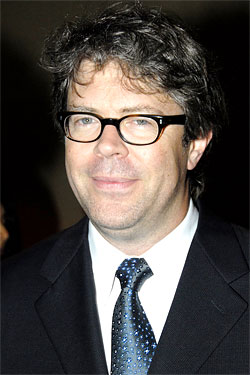
We think we know why Jonathan Franzen is taking so long to write his next novel — he seems to have virtually no interest in other people’s stories. That’s the impression that you would have gotten, anyway, if you’d come to see him read last night as part of FSG’s running series at the Russian Samovar. After debut novelist Wells Tower opened with a brutal but oddly charming story about sibling rivalry, Franzen hit the lectern in fine form — trim, without a graying hair out of place. He read an essay published in MIT’s Technology Review. A litany of beefs with technology titled “I Just Called to Say I Love You,” its main thrust is that Franzen — stop the presses — hates new things. Microsoft Word, for example. Also, emphatically, cell phones. Their worst offense? “The habit, uncommon ten years ago, now ubiquitous, of ending cell-phone conversations by braying the words ‘LOVE YOU!’” Or even worse: “I LOVE YOU.” “It makes me want to scream.” He redefined privacy as “sparing me from the intrusion of other people’s personal lives.”
There followed another bit about the sentimentality of 9/11, but somehow this didn’t bother us as much. Everyone from Susan Sontag to Elizabeth Wurtzel had been there, done that. What really annoyed us was that a writer was up there making a case against curiosity. It bothered us so much, in fact, that on the cab ride home, several flavored vodkas later, we called our other half to complain about it. We talked about The Corrections as well as Franzen’s irritating essay collection, “How to Be Alone.” She asked if our cell conversation might be annoying the cab driver, and we said that usually they’re on the phone anyway.
In this case, though, he wasn’t. He was listening to classical music and, it turns out, our conversation. When we put away our phone to pay the fare, we noticed he was in the minority of cabbies — white, middle-aged, with shaggy blond hair and a wiry frame, looking a lot like our idea of what Thomas Pynchon might look like. “I read The Corrections,” he said. “I liked it, but not ‘How to Be Alone.’ Some of the stories were good, but there were a few, I just don’t know why they were in there. I feel like he was just filling up space.” He’d rather Franzen just go ahead and write another novel. He was delighted that we paid in cash; we were delighted that he’d been eavesdropping, and that our rude verbal pollution of public space had led to a serendipitous exchange with a stranger. Cell phone 1: Franzen 0.





